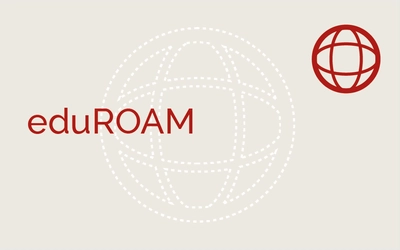What is eduroam?
eduroam is a federated service whereby participating institutions enable automated authenticated guest access to the internet by members of other participating organisations based on a user's standard username (email address) and password for their 'home' institution.
It is designed to reduce the time and support costs associated with granting guests internet access over wireless and/or wired networks. eduroam reduces the need for users to configure their laptops or mobile devices each time they visit a site or return back to their home institution.
eduroam is based on relatively simple code added to RADIUS servers that provides access controls to a participating institution’s wired and/or wireless network. eduroam enables guests to authenticate in a secure way (to protect the transmission of institutional usernames and passwords) via a federation of RADIUS servers at three tiers (regional (Asia-Pac), national (Aus) and organisational (Inst.). The federation is in essence a relatively small cog that coordinates and links to services nationwide.
The goal of eduroam is for an eduroam user to securely authenticate in an automated way to gain free internet access at authorised national and international locations.
**CAUDIT is the custodian of the 2010 eduroam® national policy for Australia and New Zealand and supports AARNet in its role as the eduroam service provider (ESP) for Australia. **AARNet has been involved in delivering eduroam services since 2007.
eduroam is a TERENA registered trademark and is an abbreviation for “educational roaming” that originated from a European National Education and Research Networks (NRENs) project to deliver a user friendly, secure and scalable internet access solution for visitors. The European eduroam confederation provides the legal framework for the organisation of the European eduroam service. The use of eduroam is restricted to the closed community served by NRENs according to their national policies.
In 2009 – 2010, an eduroam Project Group was tasked with identifying and improving on the initially implemented services and recommendations of a previous project group to fulfil diverse user expectations. The Chair of the 2009-2010 Project Group was Conrad Dare-Edwards, Charles Sturt University. Conrad was supported by James Sankar, AARNet and a project team who dedicated time and energy to a successful outcome.
In 2016, CAUDIT began collaborating with AARNet to update the existing policy in order to recognise AARNet as the service provider for Australia and not New Zealand (REANZ is the ESP for New Zealand) and to standardise terminology in line with the global policy. CAUDIT members have provided significant contributions to this review.
Useful links
eduroam national policy for Australia
https://www.eduroam.org/eduroam-and-geant/
https://www.eduroam.org/support/eduroam-documentation/ https://www.eduroam.org/about/


